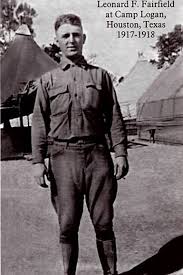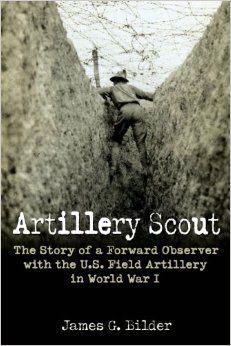I’ve read a fair number of Great War stories but this is the first one about the experiences of an American soldier to come into my hands. This super book is written by James G Bilder who also wrote of his father’s experiences serving in Patton’s Third Army in WW2. I have memories of that book but am unable to trace the review I wrote of it, although I do recall it was a robust no nonsense account without some of the varnish that often attaches itself to Patton.
As intimated, I am really impressed with this book. The author has been canny and pitches it somewhere between an audience of newbies and old sweats and I think that, on the whole, he has got the balance just about right. The impression it gives is that the Great War does not enjoy anything like the attention World War II receives in the United States and while that in-balance is more or less set in stone for a host of reasons I hope books like this go some way to bring it to the fore in the minds of military history enthusiasts.
The author paints vivid pictures of US Army life and beyond that he does well with his descriptions of civilian life and the family history of the principal character. We travel back to Edwardian era Chicago and learn something of the sectarianism in the Windy City and there is no doubt that Catholicism plays an important role in the wider story throughout the book. There is a love story and a good deal of background that helps make the, to be fair, relatively short period of combat much more relevant.
The hero of this book, Len Fairfield, is an artillery scout, a forward observer in later parlance, who went ahead and spotted for the guns, directing or correcting fire as required. We learn that scouts were picked because they had above average intelligence and this reflects well on Len Fairfield who comes across as a thoroughly decent man, strong in faith and principles. He took his role seriously but was equally as interested in finding decent food, keeping warm and staying alive. He suffered the privations of hunger, exhaustion, sickness and the usual mix of parasites and took it all on the chin with alacrity. I don’t want to sentimentalise, but he doesn’t sound any different to a several million or so others in uniform. He cares for his horse and his mates and does all the right things. You will like him.
The author hands out nuggets of interesting facts and his attempt to explain the misery of life at the front for the Americans is first class. I like his honesty dealing with the awkward truth that Pershing and his supporters got the tactical practicalities totally arse about face and this would mean the deaths of many more men than was necessary. Black Jack was a dominating presence, but his prejudices against the tactical lessons espoused by the experienced British and French just makes no sense and the American riflemen paid for it in spades.
We learn quite a bit about how US artillery batteries operated and the story of the awful battle of St Mihiel in the Argonne where the US Army lost more men, 26,000 dead, in a single battle than in any other conflict. It was where the terms D-Day and H-Hour were first used. You cannot help but love all these details.
All in all, this book is a bit of a gem. It is a well paced easy read and you will find yourself rooting for our hero. I am glad he led a fulfilling and prolific life. Len Fairfield was a top bloke and even from this distance he deserves our thanks.
The author has brought him and his era to life and I commend this book to the house.
Reviewed by Mark Barnes for War History Online.
ARTILLERY SCOUT
The Story of a Forward Observer With the US Field Artillery in World War I.
By James G Bilder
Casemate Publishers
ISBN: 978-1-61200-272-9

